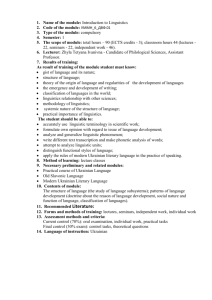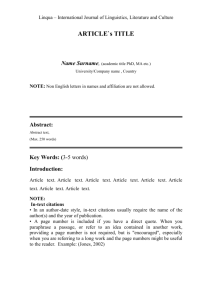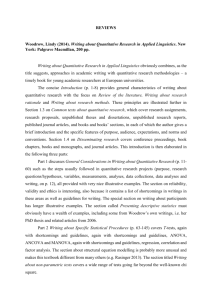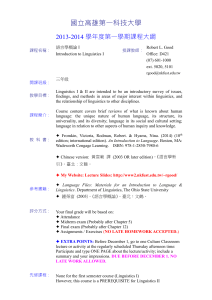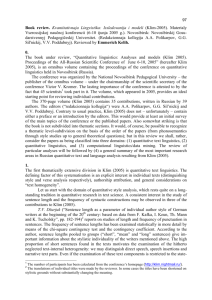module specification
advertisement
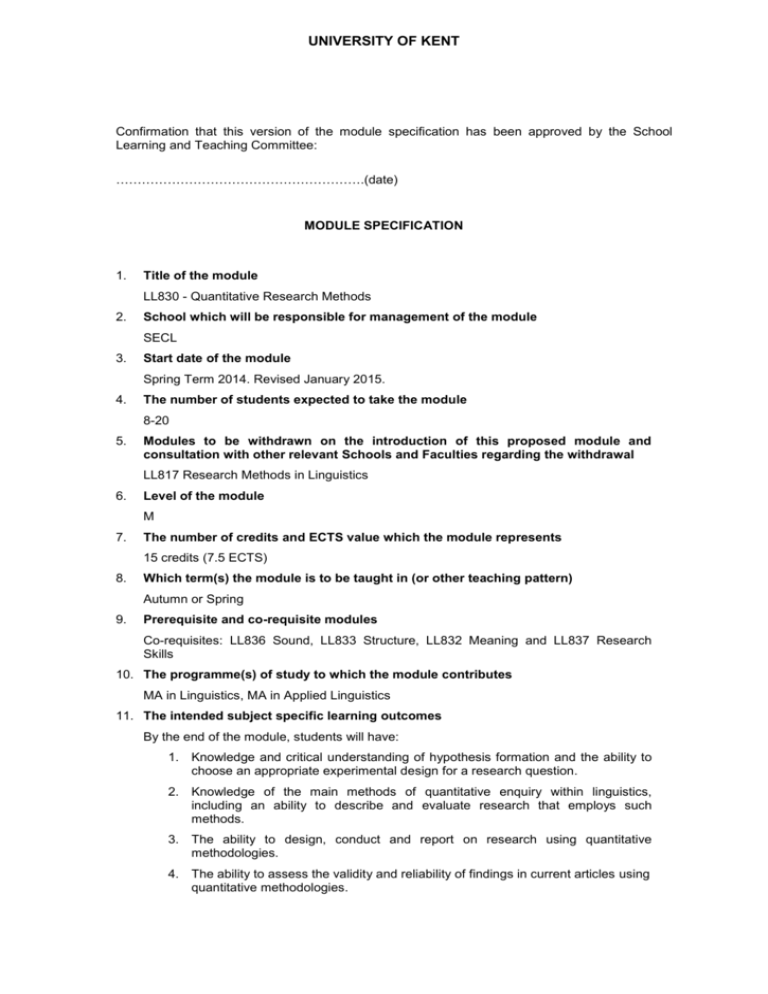
UNIVERSITY OF KENT Confirmation that this version of the module specification has been approved by the School Learning and Teaching Committee: ………………………………………………….(date) MODULE SPECIFICATION 1. Title of the module LL830 - Quantitative Research Methods 2. School which will be responsible for management of the module SECL 3. Start date of the module Spring Term 2014. Revised January 2015. 4. The number of students expected to take the module 8-20 5. Modules to be withdrawn on the introduction of this proposed module and consultation with other relevant Schools and Faculties regarding the withdrawal LL817 Research Methods in Linguistics 6. Level of the module M 7. The number of credits and ECTS value which the module represents 15 credits (7.5 ECTS) 8. Which term(s) the module is to be taught in (or other teaching pattern) Autumn or Spring 9. Prerequisite and co-requisite modules Co-requisites: LL836 Sound, LL833 Structure, LL832 Meaning and LL837 Research Skills 10. The programme(s) of study to which the module contributes MA in Linguistics, MA in Applied Linguistics 11. The intended subject specific learning outcomes By the end of the module, students will have: 1. Knowledge and critical understanding of hypothesis formation and the ability to choose an appropriate experimental design for a research question. 2. Knowledge of the main methods of quantitative enquiry within linguistics, including an ability to describe and evaluate research that employs such methods. 3. The ability to design, conduct and report on research using quantitative methodologies. 4. The ability to assess the validity and reliability of findings in current articles using quantitative methodologies. UNIVERSITY OF KENT 5. Understanding of ethical considerations which need addressing prior to the undertaking of any experimental procedure. 12. The intended generic learning outcomes By the end of the module, students will have: 1. Communicated the results of study and work accurately, with well-structured and coherent arguments in an effective and fluent manner both orally and in writing. 2. Developed their ability to work cooperatively with others, exercising personal responsibility and sensitivity. 13. A synopsis of the curriculum This module is an introduction to quantitative research methods in linguistics, with the aim of familiarising students with the main methodologies by analysis of relevant studies from the literature and hands-on experience with study design. Key topics will include: hypothesis formation; experimental design; paradigms for quantitative linguistic research; data analysis and interpretation. 14. Indicative Reading List Gravetter, Frederick & Lori-Ann Forzano. 2011. Research Methods for the Behavioral Sciences. Cengage Learning, 4th edition. Harris, Peter. 2008. Designing and Reporting Experiments in Psychology. Open University Press. Johnson, Keith. 2008. Quantitative Methods in Linguistics. Blackwell Publishing. Litosseliti, Lia. 2009. Research Methods in Linguistics. London: Continuum International Publishing Group Ltd. Meltzoff, Julian. 2010. Critical Thinking About Research: Psychology and Related Fields. American Psychological Association. Rasinger, Sebastian M. 2008. Quantitative Research in Linguistics. London: Continuum International Publishing Group Ltd. 15. Learning and Teaching Methods, including the nature and number of contact hours and the total study hours which will be expected of students, and how these relate to achievement of the intended learning outcomes This module will be taught in weekly two-hour seminars for ten weeks. Total contact hours: 20 Total Study hours: 150 Seminars will be a mixture of lecturing, group and individual activities and class discussion. Seminars will cover key research methodologies and issues related to study design and data analysis (subject specific learning outcomes 1-3 and 5). Discussions during seminars will provide experience in presenting, critiquing and interpreting research from assigned readings (subject specific learning outcome 4, generic learning outcomes 1-2). 16. Assessment methods and how these relate to testing achievement of the intended learning outcomes Problem set (1000 words): Abstract (500 words) Research proposal (2000 words): 30% 15% 40% UNIVERSITY OF KENT Presentation of research proposal in class using visual aids 15% (equivalent to 1000 words) The problem set will test learning outcomes: 11.2-4, 12.1 The abstract will test learning outcomes: 11.1-4, 12.1 The research proposal will test learning outcomes: 11.1-5, 12.1 The presentation of research proposal will test: 11.1-4 and 12.1-2 17. Implications for learning resources, including staff, library, IT and space Seminar rooms with computer facilities and large whiteboards are necessary. 18. The School recognises and has embedded the expectations of current disability equality legislation, and supports students with a declared disability or special educational need in its teaching. Within this module we will make reasonable adjustments wherever necessary, including additional or substitute materials, teaching modes or assessment methods for students who have declared and discussed their learning support needs. Arrangements for students with declared disabilities will be made on an individual basis, in consultation with the University’s disability/dyslexia support service, and specialist support will be provided where needed. 19. Campus where the module will be delivered: Canterbury


